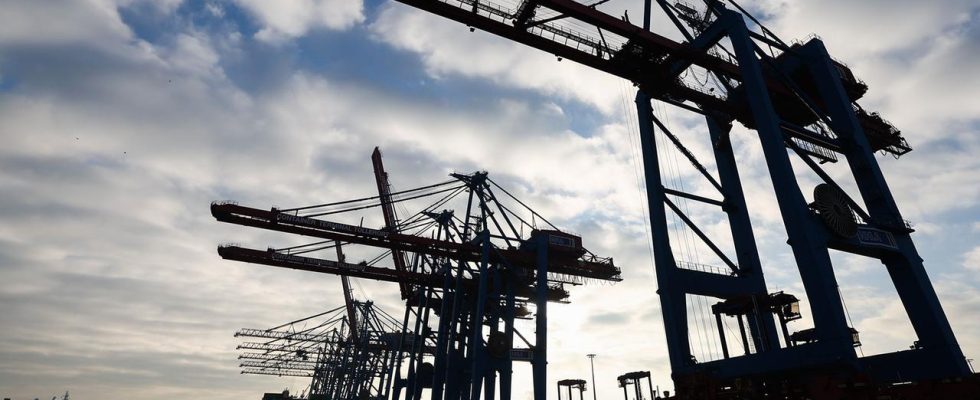The majority of business associations are entering the new year with low expectations, according to an IW survey. 2024 is likely to be a weak year for investments; no major jumps in growth are expected.
Global crises, high interest rates, a weak global economy and an uncertain budget situation. These are just a few of the topics that make business representatives look pessimistic about the new year. As a survey by the employer-related Institute of the German Economy (IW) among 47 German business associations showed, only nine of them expect a higher level of production in 2024. In contrast, 23 associations speak of a decline in production or business in the coming year.
The current situation is rated worse than a year ago by 30 of the 47 participating associations. “The situation has rarely been as bleak as it is now, and the forecast has rarely been so pessimistic,” is the summary of the IW survey. It must be taken into account that even a year ago there was no good mood in the German economy due to the energy crisis.
High energy prices put a strain on companies
But a lot has improved since then, points out Chris-Oliver Schickentanz from Capitall Asset Management. Inflation rates have recently fallen significantly, and the days of constantly rising interest rates appear to be over for the time being. Nevertheless, Schickentanz sees challenges for the German and European economies: “Europe is still suffering from high energy prices. Companies are burdened by this – compared to US companies, this is two to three times the cost burden that European companies face.” That is a massive competitive disadvantage.
According to the IW survey, the current situation is only rated better in six sectors than last year; in the remaining eleven, the economic situation is said to be unchanged. The weak development of the global economy as a result of the geopolitical upheaval, the tightening of monetary policy as a result of high inflation, and the uncertainty among companies and households as a result of the budget policy uncertainty in Germany depressed the outlook for 2024.
Uncertain budget situation in Germany
“The German economy is suffering across the board from being unable to plan,” explained IW director Michael Hüther. The “budget disaster” in the government coalition shows how serious the situation is. Hüther warned of deindustrialization and an increasing migration of companies from Germany and called, among other things, for a reform of the debt brake. In an interview with the Deutschlandfunk However, the economist spoke out against lifting the debt brake.
“But this one-sided attention to debt and not to gross domestic product now naturally leads to the government itself having an aggravating effect on overall economic development,” said Hüther. It’s about finding clever solutions, for example by setting up a society-wide fund for investments in infrastructure or transformation. All investments for which planning and process acceleration is feasible belong in such a fund, but subsidies do not, says Hüther.
Better ones Framework conditions required
Commerzbank’s chief economist, Jörg Krämer, also has specific demands on politicians. To tagesschau.de he said: “Companies finally need better framework conditions, they need competitive energy costs, they need faster approval procedures, they need better roads.” The list is long.
According to the IW survey, energy-intensive sectors in particular, such as foundries, the ceramic industry, the leather industry and plastics processing, are expecting a significant deterioration. The real estate industry, construction and construction industries as well as banks and savings banks are also pessimistic in view of the high interest rates.
Sales decline by around a third
From an economic point of view, not everything is going well in the world’s two major economies, the USA and China. Many trading partners are already feeling this. Whether they are mechanical engineers, chemical companies or car manufacturers. Goods “Made in Germany” are no longer in great demand. In many industries, fewer orders are coming in. According to a calculation by the consulting firm EY, the total sales of the 100 largest German companies fell by nine percent this year. EY attributes this primarily to the sharp decline in energy suppliers.
66 of the 100 companies with the highest sales in Germany were still able to increase their sales in the first three quarters of the year. While automobile manufacturers and suppliers grew by eleven percent, the healthcare industry now recorded a decline in sales of 12 percent after the Corona boom. According to an EY analysis, logistics companies even shrank by 14 percent, while the chemical industry recorded a decline of 20 percent.
EY expects “none growth leaps”
Looking at the numbers, EY Germany boss Henrik Ahlers says the headwind is increasing: “Many companies have recently only grown slightly – if at all – and often with growth rates below the inflation rate.” The automotive industry was still the growth driver this year, but the air is also becoming increasingly thin for Germany’s flagship industry in view of sluggish global new car sales.
According to EY, global political uncertainties and wars led to considerable uncertainty – both among companies and the population. Big jumps in growth are not expected for the coming year.


